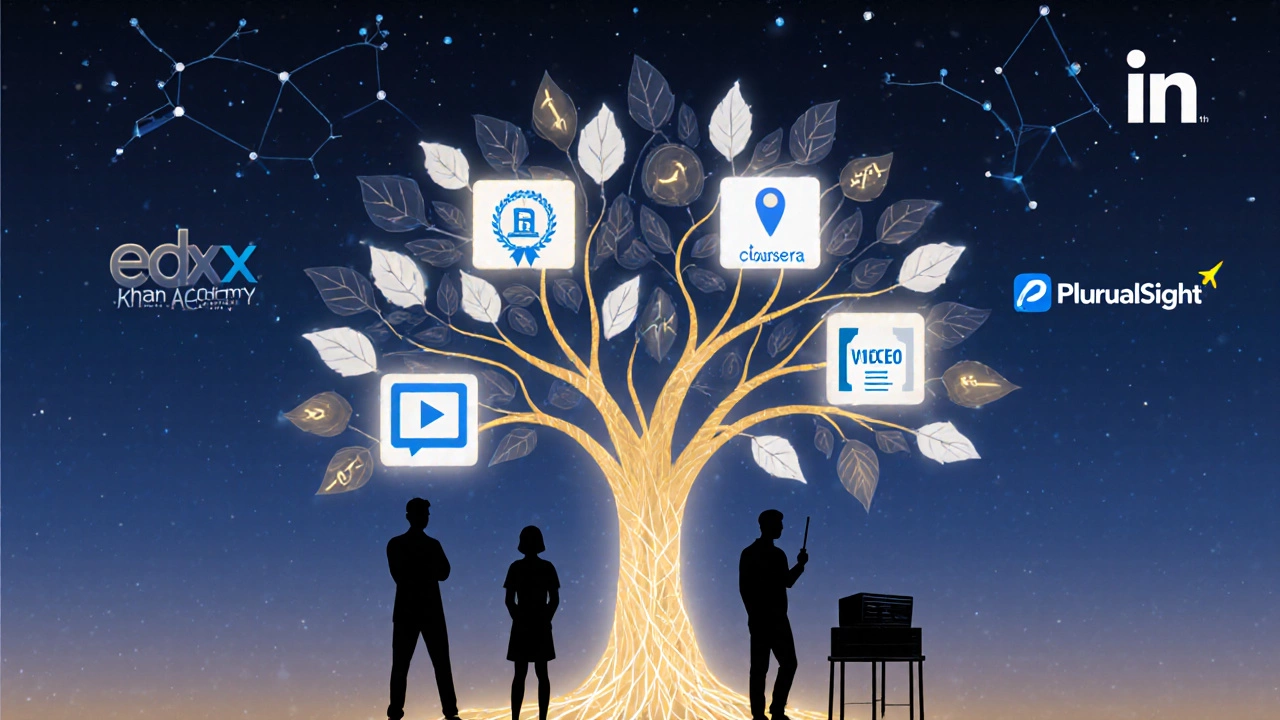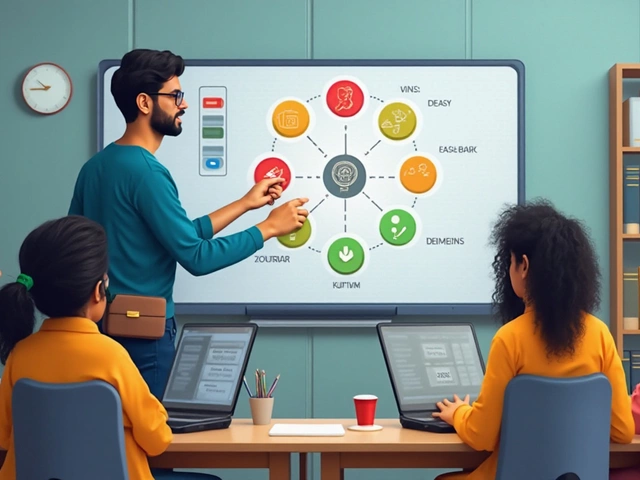Nov
16

- by Dhruv Ainsley
- 0 Comments
Online Learning Platform Selector
Choose your learning goal to find the best platform for your needs.
Select your goal above to see the recommendation
When you think about learning something new online, you probably think of one or two big names. But the truth is, there are dozens of platforms out there-and not all of them are used the same way. Some are for university-level courses. Others are for quick skill boosts. A few are free. A few cost hundreds. So which ones are actually being used the most in 2025?
Coursera: The University Bridge
Coursera isn’t just popular-it’s the most widely used platform for accredited online degrees and professional certificates. Over 135 million learners have signed up since 2012, and it’s still growing. Why? Because it partners directly with top universities like Stanford, Yale, and the University of London. If you need a certificate that employers recognize, Coursera is your go-to.
It’s not just for college grads. Many working professionals use Coursera to upskill in data science, project management, or AI. Google and IBM even design their own certification tracks here. You won’t find these on YouTube. They’re structured, assessed, and verified.
Udemy: The Marketplace of Skills
If Coursera is the university, Udemy is the flea market of online learning. With over 250,000 courses on everything from Excel shortcuts to blockchain development, it’s the most diverse platform in terms of content. And it’s the most used by casual learners.
Unlike Coursera, Udemy doesn’t require institutional partnerships. Anyone can create a course. That means you’ll find wildly different quality levels. But it also means you can learn how to edit TikTok videos or build a Shopify store in under an hour-for less than $20. Sales happen daily, and most courses drop to $10-$15. That’s why over 60 million people use it every year.
It’s not for credentials. It’s for quick fixes. Need to learn Canva? Udemy has it. Want to know how to use Notion for team planning? There’s a course for that. It’s the go-to when you need something specific, fast, and cheap.
edX: The Nonprofit Alternative
Founded by Harvard and MIT, edX started as a nonprofit experiment in open education. Today, it’s still one of the most trusted names in online learning, especially in the Global South. It offers free access to course materials from over 160 institutions, including MIT, Berkeley, and the University of Tokyo.
What sets edX apart is its focus on academic rigor. You can audit most courses for free. But if you want a verified certificate, you pay a small fee-usually under $100. It’s the platform of choice for students in India, Nigeria, and Brazil who want university-level learning without the tuition.
edX also partners with governments and NGOs to offer workforce training. In Australia, for example, it’s used in state-funded digital literacy programs. It’s not flashy. But it’s reliable.

Khan Academy: Free Learning for Everyone
If you’re looking for completely free, no-signup-required learning from kindergarten through college prep, Khan Academy is the only platform that delivers at scale. It’s used by over 150 million learners worldwide, including millions of students in public schools.
It doesn’t offer certificates. It doesn’t sell courses. It doesn’t even have ads. It’s funded by donations and grants. And it’s built for mastery. Need to understand fractions? Watch a 10-minute video. Practice 10 problems. Move on. The platform tracks your progress and adjusts the difficulty automatically.
It’s especially popular with parents helping kids with homework, teachers assigning supplemental lessons, and self-learners rebuilding math or science foundations. In Melbourne, over 12% of high school students use it weekly for VCE prep.
LinkedIn Learning: The Career Accelerator
LinkedIn Learning used to be Lynda.com. Now it’s baked into the world’s largest professional network. And that’s its superpower. If you’re already on LinkedIn, you can start a course with one click. Your progress syncs with your profile. Employers see it.
It’s the top choice for corporate training. Companies like Dell, Accenture, and Telstra license LinkedIn Learning for their employees. The courses focus on soft skills-communication, leadership, time management-and technical tools like Excel, Python, and Salesforce.
Over 20 million people use it monthly. And unlike other platforms, you don’t need to pay separately if your employer has a corporate account. Many Australians access it through their workplace.
FutureLearn: The Global Classroom
Based in the UK but used heavily in Australia and Canada, FutureLearn stands out for its social learning model. Courses are designed around discussion. You’re not just watching videos-you’re replying to peers from 190 countries.
It partners with universities like King’s College London and Monash University. Many of its courses are time-bound, with weekly deadlines. That creates structure for people who struggle with self-paced learning.
It’s especially popular with adult learners and those returning to education after a break. The platform’s focus on reflection and peer feedback makes it ideal for humanities, education, and health sciences.
Pluralsight: For Tech Professionals Only
If you’re a software developer, data engineer, or IT admin, Pluralsight is likely already in your toolkit. It’s not for beginners. It’s for people who already code and want to get better.
With over 7,000 courses focused on programming languages, cloud platforms, cybersecurity, and DevOps, it’s the most specialized platform on this list. It even offers skill assessments that measure your exact proficiency level.
Used by 1.5 million professionals, it’s the go-to for tech teams that need standardized training. If you’ve ever heard someone say, “I took the AWS Advanced Networking course,” chances are it was on Pluralsight.
Which Platform Is Right for You?
There’s no single “best” platform. It depends on what you’re trying to do.
- If you want a degree or professional certificate → Coursera
- If you need a quick skill for your job → Udemy
- If you’re a student or on a tight budget → Khan Academy
- If you’re climbing the corporate ladder → LinkedIn Learning
- If you’re in tech and want deep expertise → Pluralsight
- If you’re studying at university level without paying tuition → edX
- If you learn better with discussion and community → FutureLearn
Most people use more than one. A teacher might use Khan Academy for students, Coursera for their own certification, and LinkedIn Learning to improve their presentation skills.
What’s Changing in 2025?
Platforms are shifting. AI tutors are now built into Coursera and Udemy. You can ask questions in real time while watching a lesson. LinkedIn Learning now recommends courses based on your job title and connections. Khan Academy added AI-generated practice problems that adapt to your mistakes.
Mobile use is up 40% since 2023. Most people now learn on their phones during commutes or lunch breaks. That’s why platforms are cutting course lengths and adding audio-only versions.
And pricing? Subscription models are winning. Instead of buying one course at a time, more people are paying $10-$30/month for unlimited access. It’s cheaper than textbooks and more flexible than university.
What is the most used online learning platform in 2025?
Coursera is the most used platform globally for accredited courses and professional certificates, with over 135 million learners. Udemy has more total users because of its massive course library and low prices, but Coursera leads in credibility and institutional partnerships.
Is Khan Academy really free?
Yes. Khan Academy has never charged for access to its lessons, videos, or practice exercises. It’s funded by donations from foundations like the Gates Foundation and Google. No credit card is needed. No ads. No sign-up required to learn.
Are LinkedIn Learning certificates worth anything?
Yes-if you’re applying for jobs in business, marketing, IT, or management. Employers see LinkedIn Learning completions on your profile and recognize them as proof of initiative. They’re not degrees, but they’re valued more than random online certificates because they’re tied to your professional identity.
Which platform is best for learning coding?
For beginners, Udemy has affordable, project-based courses. For intermediate to advanced coders, Pluralsight is the gold standard because of its skill assessments and deep technical content. Coursera offers university-level computer science degrees if you want a formal credential.
Can I get a degree online for free?
You can audit full university courses for free on edX and Coursera. But to earn an actual degree, you’ll need to pay. Some universities offer low-cost online degrees-like the University of the People, which charges $4,000 for a full bachelor’s. Free degrees don’t exist yet, but affordable ones do.





